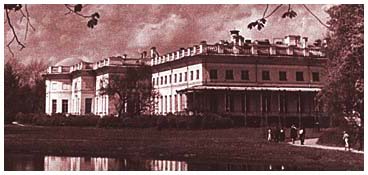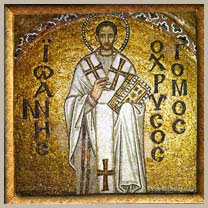On either side of the nave of Hagia Sophia are great tympana, most of the mosaics there have been lost, but a few fathers of the church survive


Introduction
Last days at Tsarskoe Selo, being the personal notes and memories of Count Paul Benckendorff; telling of the last sojourn of the Emperor & Empress of Russia at Tsarskoe Selo from March 1 to August 1, 1917
Count Paul Benckendorff, born in 1853, was the son of Count Constantine Benckendorff, minister to the Court of Wurtemberg at the time of his death, and of Princess Louise de Croy. He was educated in Paris, where Countess Benckendorff, his mother, had settled after the death of her husband. He was a cadet in the Corps des Pages at St. Petersburg, and subsequently joined the cavalry regiment of the Gardes-á-Cheval. He took part, at his own request, in the Russian-Turkish War of 1877, and was sent to the Asiatic front. After the fall of Kars he was entrusted with the duty of bearing the official news of this victory to H.M. the Emperor, Alexander II. The Emperor made him an A.D.C., and attached him to the personal staff of his brother, the the Grand Duke Michael, who had a command in the Caucasus, for the duration of the war. At the end of the war, he was attached to the Emperor's household, and he served the three sovereigns who succeeded one another on the throne during the last forty years. In return for his services he was promoted to be General A.D.C. and Grand Marshal of the Court. It was in this capacity that he took part in the terrible events of March 1917, and had at least the consolation of mitigating the lot of his masters by his devotion. He and his wife (born Princess Dolgoruki) shared the captivity of Tsarskoe Selo. When the Emperor left Russia for Siberia, he was ordered to remain behind so as to look after the affairs of his sovereign. His step-son, Prince Vassili Dolgorukov, the son of Countess Benckendorff by a former marriage, followed the Emperor into Siberia and wrote some letters, which Count Benckendorff quotes, relating the events of this tragic journey, until the moment when he was separated from the Emperor on their arrival at Ekaterinburg. From that day his unhappy mother received no news of him.

The facade of the Alexander Palace from accross the Kitchen Pond showing Alexandra's Balcony
There was now nothing to retain Count and Countess Benckendorff in Russia; but it was only after three years of suffering, heightened by the despair which the lot of their masters and the ruin of their country brought them, that they obtained permission to leave the country.
But in undertaking this journey Count Benckendorff relied too greatly on his exhausted constitution. He died in a dilapidated hospital on the Esthonian frontier, on the 28th of January 1921, at the moment he expected to regain his liberty.







